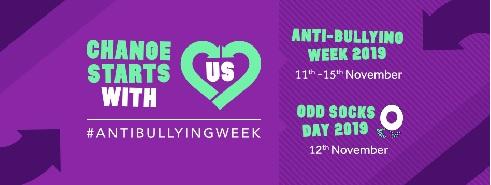
Published on: 13/11/19
Bullying can happen to anyone. Here are our top tips.

Published on: 13/11/19
This week is National Anti-bullying week 2019 with the theme ‘change starts with us’ based on the ethos small change, big difference.
The Anti-Bullying Alliance says that change starts with a conversation and it’s a collective responsibility to stop bullying.
Bullying is something that can happen to anybody of any age, sex or nationality. Around a quarter of children and young people say it is something they worry about.
A study in 2016 revealed that almost three in five people aged 11 to 17 will have been either bullied or assaulted by someone of a similar age. And a person doesn’t have to be face-to-face with someone for them to be bullied. It can include people talking about others. Cyber bullying is also something that is quite common where the bullying happens online or on mobile phones.
Children and young people with a disability, and those with special educational needs, are around twice as likely to be bullied than those without a disability.
It’s important to feel safe. Never put yourself in a situation where you might be in danger or will be open to assault.
Tips on dealing with bullying:
These tips come from Me and my brain, our handbook for teenagers affected by acquired brain injury. You can order the book here.